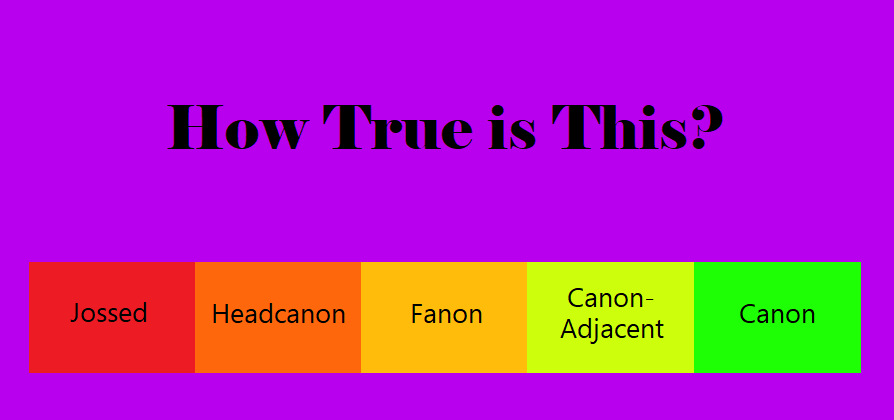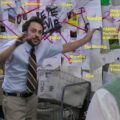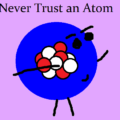In this blog post, I’m going to discuss some basic definitions for a few terms that describe how “true” something is in a fictional universe—and then dive into the controversies surrounding them.
One quick definition to get out of the way, first: A fandom consists of the “fans” of a particular universe or group. In this case, I’m using fandom to mean people who are closely following and/or creating content about a specific fictional universe or multiverse; the Harry Potter fandom, for instance, or the Gravity Falls fandom. Now, I present a scale from 1-5 on how true something is…

5: Canon
Canon is basically the rules or textbook; the fandom’s metaphorical bible. In its strictest definition, it’s the main media that contains information about the universe. In Star Trek, the original TV series, as well as the following TV series (including The Next Generation, Discovery, etc.) and movies, is undeniably canon. In Star Wars, the movies are the main canon. People sometimes disagree on what’s canon versus what’s canon-adjacent.
4: Canon-Adjacent
Canon-adjacent materials are those which some may consider canon, but they may contain serious continuity errors or be put out by a different or altered source.
Sometimes there is a central authority on what is canon-adjacent or not, but it’s often ignored. Doctor Who, which is primarily a television show, has many comic books and novels that may or may not be canon depending on who you ask. Often, comic books or reference books are considered canon-adjacent. So are statements put out by creators.
This general uncertainty marks canon-adjacent materials. They are definitely, however, not just fanon. There’s something more official to them.
3: Fanon
Fanon is a portmanteau of “fan” and “canon.” By definition, fanon is a fuzzy term. It’s about what has been embedded in the general conscience of the fans. For something to be fanon, it has to be accepted by a wide variety of fans, and, while some choose to ignore it, it is generally not too controversial.
In Harry Potter, for example, Hermione’s parents tend to be named Dan and Emma (likely after Daniel Radcliff and Emma Watson, who played Harry and Hermione). The creator of Harry Potter made no statement to this effect, and yet it is wide-spread. Sometimes fanon can be traced back to a single source. The Avatar: The Last Airbender fandom has some widely-accepted original characters that populate its world. These characters mostly came from a single creator, but can still be considered fanon.
Romantic relationships between characters are nearly always controversial, and are not fanon. Even if nearly everyone who watches BBC Sherlock believes that Sherlock and John should be or are in a relationship together, there are still a decent portion who disagree and support other relationships. Sometimes fanon can start flame wars (the Wizengamot in Harry Potter, for example; that’s always fun to watch) but generally it’s well-enough accepted that it doesn’t. In short, fanon is something that a large number of fans treat as canon, even though it isn’t.
2: Headcanon
A headcanon is like a fanon that’s in your head. Other people may share your headcanon, but it’s not nearly as universal as fanon. Frequent headcanons include the sexual orientation of a character, fan theories about the backstory of a character that aren’t nearly-universal, and the ideas about a world that you believe.
Headcanons are not just something you think would be cool. I might have an awesome idea about an alternate universe where the characters from Hamilton have superpowers (I do, by the way), but I don’t headcanon Alexander Hamilton as having weather powers. A headcanon is something you believe as true about the actual universe. It’s your own private rules. That said, I can have a headcanon that if he was a superhero, he would have weather powers.
1: Jossed/Blatantly Untrue
This is something that just isn’t true. Maybe in your imaginary universe or deluded headspace, you’re right, but nowhere else. Jossed is a fan term that means it’s proved untrue, though it can apply to a variety of methods and degrees. From what I could find, it’s named after Joss Wheaton, who has a habit of telling fans that their theories are way off.
Note that in long-running fandoms, things that are jossed can remain prevalent, and sometimes the canon is actually disregarded. For example, it’s considered acceptable by a large portion of the Harry Potter fandom to ignore The Cursed Child play, due to the gap in time between the seventh book and its release, the different medium, and its general unpopularity (personally, I like it, though).
Additionally, sometimes a jossing comes by the creator’s word only; something that is jossed is not necessarily proved wrong in direct canon. Some things may fit in both category 1 and category 3, especially when you count delays and the status of canon-adjacent material.
But Wait—You’re Wrong!
Without a doubt, some of the more fandom-savvy people here are thinking just that. And you know what? You’re right. I’m treating these words like they have an actual definition, but they really don’t. They’re words that people use to mean different things at different times.
People will disagree on whether something is headcanon or fanon, fanon or canon-adjacent, canon-adjacent or canon. There’s some canon that people are convinced is jossed and some jossed fanon that people are convinced is canon. Something may belong in more than one category; or it may be fanon that eventually becomes canon or canon-adjacent. Something may once be canon, but then be retconned into category 1—or fall prey to a continuity error. Long-running series, no matter the medium, often lead to a lot of blurry lines.
Fanon in particular is very, very difficult to define. It depends on what circles you frequent, what fan-made media you consume. There may be a die-hard Harry Potter fan reading this who’s never heard Hermione’s parents called Dan and Emma in their life.
And that’s okay. Fandoms are difficult to accurately describe, especially when you get people arguing over what a “fan” even is. But with these terms, we can discuss some very interesting topics.
The Collective Conscience and Fan Media
You may be wondering, at this point: what are your qualifications? How do you know more about this than me? Maybe you’ve gone to several Doctor Who conventions and come to different conclusions about the Doctor Who fandom than I have.
And this is a large reason why researching fandoms is so very difficult.
I’m in multiple Doctor Who groups as well as a Gravity Falls group and a Harry Potter group on Facebook. Yes, I know, it’s an old people site. And when I gather data from there, it’s biased—both by the age ranges and users, and by my own lack of statistical study.
But my main knowledge of fandoms comes from reading fanfiction. I’ve been on fanfiction.net and Archive of Our Own (AO3). There are other sites; Wattpad, for example. I’m already losing a great deal of data there.
And I filter out a great deal of results, because there’s quite a lot that I refuse to read. Which means I’m completely ignorant of many trends.
So, while I’ve studied this to a decent degree, I simply don’t have access to a great deal of data. I’m on a Doctor Who forum, but there are others. Maybe opinions vary.
If you stick to the Harry Potter Facebook group, you’ve probably never heard of the absurd theory that Draco Malfoy is a Veela. But perhaps if you’re reading certain fanfictions on AO3, you’re convinced that it’s fanon.
The way you view a fandom depends on which specific cross-section you see of it. And while I’ve tried to get a diverse view, there are some things I just don’t want to know.
So, This Is Useless?
Nope! At the very least, it’s fun, and it will enable you to better navigate fandoms.
But it’s also highly fascinating. There’s a lot we can learn by examining the way people act when they care about something. And people can be deeply invested in fictional worlds.
I’m not a psychologist. Still, I can see the applications of studying fandoms. They take ideas and spread them like wildfire. They create work based off of other things, showing their unique interpretations. And then these interpretations combine and form something new.
Take the fanon and wide-spread headcanons for the Harry Potter universe, and you’ll end up with a world very different from the original seven books, but no less valid.
Analyzing fandoms is like watching a giant game of telephone; but instead of gibberish, the end result has taken on a life of its own.
Some of my headcanons from Gravity Falls: Mabel has ADHD, Dipper has anxiety, Ford is aromantic asexual (aroace), Bill is from Flatland (fanon, sort of, and also kind of borderline-canon, but not canon). Read the picture’s caption.


I think the interplay between creators and fandoms is so fascinating—sometimes the creator will incorporate fanon or explicitly reject it or just leave it open to interpretation.
And sometimes creators try to add to or revisit or clarify things much later, and how the fandom then reacts to these post-facto declarations.
Great topic! What are some of your favorite fanon and/or headcanon?